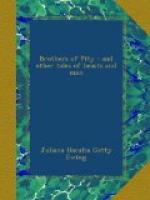We called her Shriny—why, I know no more than when I first read Croker’s delightful story of “The Soul Cages” I knew why the Merrow whom Jack went to see below the waves was called Coomara.
My remembrance of even what we fancied about Shriny is very dim now; and as my brother was only four years old (I was eight), his is not more distinct. I know we thought of her, and talked of her, and were always eager to visit her supposed abode, and wander together amongst its rotten pillars (which, as we were so small, seemed lofty enough in our eyes), where the mussels and limpets held tightly on, and the slimy, olive-green fucus hung loosely down—a sea-ivy covering ruins made by the waves.
I have never been to the place since those days. If Shriny’s palace is there now at all, I dare say I should find the stakes to be stumps, and all the vastness and mystery about them gone for ever. And yet we used to pretend to feast with her there. We served up the seed-vessels of the fucus as fish. I do not think we really ate them, we only sucked out the salt water, and tried to fancy we were enjoying the repast. Once we began to eat a limpet!—Beyond that point my memory is dumb.
I wonder how we should have felt if Shriny had really appeared to us, as Coomara appeared to Jack Dogherty, and taken us down below the waves, or kept us among the stakes of her palace till the tide flooded them, and perhaps filled it with wonderful creatures and beautiful things, and floated out the dank, dripping fucus into a veil of lace above our heads; as our mother used to float out little dirty lumps of seaweed into beautiful web-like pictures when she was preserving them for her collection.
Shriny never did come, though Mr. Croker says Coomara came to Jack.
Perhaps, young readers, some of you have never read the story of the Soul Cages. It is a long one, and I am not going to repeat it here, only to say a word or two about it, for which I have a reason.
Jack Dogherty—so the story goes—had always longed to see a Merrow. Merrow is the Irish name for seafolk; indeed, it properly means a mermaid. And Jack, you know, lived in a fairy tale, and not in lodgings at a watering-place on the south coast; so he saw his Merrow, though we never saw Shriny.
I do not think any of the after-history of the Merrow is equal to Mr. Croker’s account of his first appearance to Jack: afterwards “Old Coo” becomes more like a tipsy old fisherman than the man-fish that he was.
The first appearance was on the coast to the northward, when “just as Jack was turning a point, he saw something, like to nothing he had ever seen before, perched upon a rock at a little distance out to sea; it looked green in the body, as well as he could discern at that distance, and he would have sworn, only the thing was impossible, that it had a cocked-hat in its hand. Jack stood for a good half-hour, straining his eyes and wondering at it, and all the time the thing did not stir hand or foot. At last Jack’s patience was quite worn out, and he gave a loud whistle and a hail, when the Merrow (for such it was) started up, put the cocked-hat on its head, and dived down, head foremost, from the rocks.”




